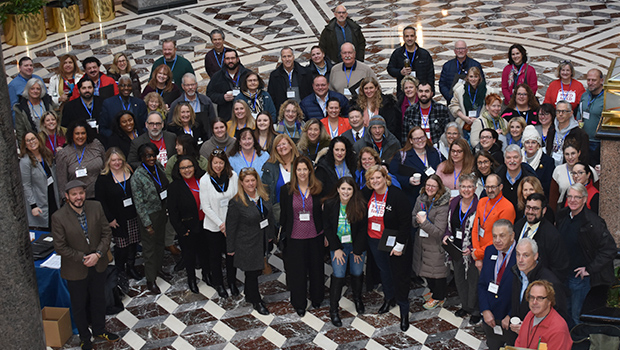She earns $4,000 a month as a reading specialist and pays $3,000 per class toward her master’s degree.
His son lives with multiple roommates to cover rent; 30 percent of his income goes to student loans.
Down three paraeducators, she doesn’t leave school until 7 p.m. The impossible workload means she’s violating IEPs on a daily basis.
Unable to afford unpaid, full-time student teaching and multiple testing fees piled on them, their peers are dropping out of teacher prep programs for other careers.
As second-career educators, they worry about their ability to retire.
Less than ten years into his career, he laments that overtesting has taken the joy out of teaching.
His social studies colleague left her job as a special education teacher because, in her words, she “could never get the work done and couldn’t spend any more Fridays crying.”

Foreground: Rep. Kevin Brown talks to physics teacher Kristen Basiaga, president of the Glastonbury Education Association.
“We all know there is a teacher shortage in Connecticut, and it’s of great concern,” said Avon fourth-grade teacher Jon Moss, adding, “The shortage that we’re seeing in special education and related services, such as speech-language pathologists, school counselors, and psychologists, is an emergency. The needs among our students are skyrocketing both in terms of the number of students requiring services and the magnitude of the services they need.”
These were just a few of the personal stories teachers shared with lawmakers at CEA’s Breakfast with Legislators this Saturday, when 19 lawmakers and more than 100 teachers from every corner of the state came together at the Legislative Office Building for candid conversations about the teaching profession and the multiple crises facing Connecticut schools.
“How many of you are up against a teaching shortage and budget cuts in your districts?” CEA President Kate Dias asked the packed room. Three-quarters of attendees’ hands went up.
“We are hitting our points hard and with incredible persistence this year,” she said. “Our agenda is about what teachers tell us is critical to address. We have big asks this legislative session, because absent schools, communities fall apart. And you can’t ask educators—who are teaching extra classes, who don’t have time to use the bathroom during the day, who feel threatened that their 30-minute lunch could be on the table again, who encounter people who don’t understand how impossible dual instruction is—you can’t look at those overstressed educators and say, ‘What I’d really like you to do is be innovative and create new programs.’”

Foreground: Rep. Rachel Chaleski hears from CEA-Retired President William Murray.
Open eyes, ears
While some of the challenges facing teachers were well-known to their elected officials, the extent and severity of problems teachers shared were eye-openers.
“It was inspiring to see the strong turnout at this weekend meeting from both teachers and legislators,” said CEA Legislative Commission Chair Kellie Choquette, who said that hearing firsthand accounts of teachers’ personal experiences in the classroom as well as legislators’ takes on the issues was energizing. “I look forward to continuing our advocacy through the remainder of this legislative session—and beyond.”
“We are aware that your work is the most important work going on in the state of Connecticut, and we know there is a monumental wave of problems facing all of you,” said Senator Martin Looney. “We want to do all that we can to support you.”

Glastonbury teacher Matt Zabroski talks to Rep. MD Rahman.
Also attending the breakfast were Senators Bob Duff, Julie Kushner, Matthew Lesser, MD Rahman, and Derek Slap, as well as Representatives Tim Ackert, Jill Barry, Amy Morrin Bello, Kevin Brown, Rachel Chaleski, Jeff Currey, Mike Demicco, Tom Delnicki, Keith Denning, Jamie Foster, Jane Garibay, Jillian Gilchrest, and Chris Poulos. In addition to their roles as legislators, Poulos and Brown are also active teachers and CEA members.
“As we center our conversation in the weeks and months to come, it’s important that we remind people it’s because of teachers, who put their heart and soul into educating children, that every profession is possible,” said Dias. “You will see CEA Communications’ Because of a Teacher campaign is front and center to remind decisionmakers of that fact.”
“Kate is here advocating for you every day, all day, as much as she can, and legislators in this building know her,” said Education Committee Co-Chair Jeff Currey, adding, “It’s important that all of you are also meeting with your delegations in your districts and taking that message home. Let them know who you are and what you’re fighting for.”
“That direct contact is so important,” said Akert. “Let us know what we can do; we’re here to fix things and help wherever we can.”

“We need to hear your voice,” Sen. Derek Slap told educators. Here, he speaks to Bloomfield teacher Gail Jorden.
“Joining us today are the Senate president, the majority leader, the House Education chair, and many other representatives and senators from both parties,” CEA Executive Director Donald Williams pointed out, commending legislators for coming out, listening to teachers, and pledging to move meaningful legislation through in 2023. He also praised CEA members for advocating for their colleagues and students. “This is a crucial year of legislative challenge and opportunity, where getting key legislation passed is a once-in-a-generation opportunity. There’s a lot to do between now and June, but this has been a great day.”
In addition to the lawmakers present, Williams noted that many others who were unable to attend CEA’s breakfast looked forward to other opportunities to hear from their educator constituents.
Duff remarked, “We are committed to working on education funding and ensuring that boards of education are spending the money we send them for the classrooms and for what you need to do your jobs. Keep fighting with us and coming up here to get things done.”
“Legislation really does matter, because when good education bills are passed, it shows that the highest decision-making bodies in the state value us and our work,” said CEA Vice President Joslyn DeLancey.
“We need to hear from teachers like you, who can explain policy and practice,” said Poulos, himself a teacher. “We need to engage more teachers and get you all involved and sharing. The more teachers are engaged, the more agency they have, and the more satisfied they are with their careers. Others who see you feel good, and it helps elevate the profession. We need to give teachers agency and voice to turn around the retention and recruitment problem.”
“We need your help in the public hearing process,” said Slap. “Come participate. We need to hear your voice over the next few months.”







